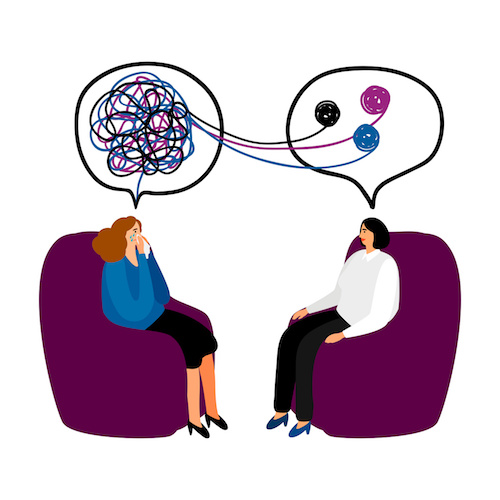Comprehensive Overview to Mental Health And Wellness: Recognizing Therapy, Treatment, and Available Resources
Psychological health and wellness is a vital aspect of general wellness. Recognizing the numerous types of counseling and treatment can empower individuals encountering obstacles. Each therapy type is created to satisfy specific requirements, supplying customized support. Numerous continue to be unaware of the sources available to them. This guide aims to brighten these alternatives, attending to usual concerns and obstacles. It raises an essential inquiry: exactly how can one efficiently navigate the intricacies of psychological wellness assistance?
Comprehending Mental Wellness and Its Relevance
Psychological health and wellness acts as a vital structure for total wellness, affecting exactly how people think, really feel, and connect with others. It encompasses emotional, mental, and social elements, impacting daily performance and top quality of life. Great mental health advertises strength, allowing people to manage stress and anxiety and navigate difficulties efficiently. Conversely, bad mental health can result in a variety of issues, including anxiousness, clinical depression, and difficulty in relationships.Understanding mental wellness is essential, as it assists to decrease preconception and urges open discussions regarding psychological struggles. Recognition of mental health likewise highlights the value of self-care and seeking assistance when required. Individuals that prioritize their psychological well-being are more most likely to engage in healthy and balanced habits, keep satisfying relationships, and contribute positively to their neighborhoods. Identifying the relevance of mental wellness promotes a holistic strategy to wellness, inevitably boosting the general lifestyle for people and society overall.

Types of Counseling and Therapy
Effective mental healthcare commonly involves various forms of therapy and treatment customized to individual needs. One common kind is specific therapy, where a therapist functions individually with a client to deal with particular issues. Group therapy, on the other hand, enables individuals to share experiences and sustain each other in a structured atmosphere, commonly guided by a facilitator. Family therapy focuses on improving communication and resolving disputes within household characteristics, while couples treatment addresses relationship obstacles between partners.Additionally, specialized counseling kinds, such as profession therapy or grief therapy, target certain life situations - Mental Health Resources. Cognitive-behavioral treatment (CBT) emphasizes the partnership between sensations, ideas, and habits, whereas alternative techniques might incorporate numerous techniques, consisting of mindfulness and art treatment. Each type serves distinct functions, using diverse paths for people seeking to enhance their mental health and health
Common Healing Techniques
Numerous therapeutic strategies play a crucial role in psychological health and wellness therapy. Cognitive Behavior modification concentrates on transforming adverse idea patterns, while Psychodynamic Treatment Techniques discover subconscious processes. Humanistic techniques stress individual growth and self-actualization, supplying diverse pathways for recovery.
Cognitive Behavioral Therapy
Cognitive Behavior Therapy (CBT) stands apart as a widely identified technique in the field of mental health and wellness therapy, highlighting the connection between actions, sensations, and ideas. This organized, goal-oriented therapy intends to identify and challenge negative idea patterns, enabling people to establish healthier coping devices. CBT is typically used to address various psychological wellness issues, consisting of stress and anxiety, anxiety, and obsessive-compulsive condition. Sessions typically include the specialist and client functioning collaboratively to evaluate and establish certain objectives progress. Strategies made use of in CBT may include cognitive restructuring, exposure treatment, and skill-building workouts. Via these techniques, individuals find out to change their believed processes and actions, ultimately fostering emotional strength and improving general mental wellness.
Psychodynamic Therapy Methods
Psychodynamic treatment techniques focus on checking out the subconscious mind to understand exactly how past experiences form present actions and feelings. Trick approaches include totally free organization, where customers reveal thoughts without censorship, allowing the development of subconscious feelings. Desire analysis is another necessary technique, permitting specialists to analyze the symbolic significances of desires, revealing hidden disputes. Transference plays a significant duty, as clients job feelings and mindsets from past relationships onto the therapist, providing insights right into relational patterns. Additionally, therapists might use analysis, helping clients acquire understanding of underlying problems and conflicts. By promoting a much deeper understanding of inner processes, psychodynamic therapy aims to advertise emotional recovery and individual growth, inevitably improving clients' self-awareness and connections.

Humanistic Approaches Described
Humanistic strategies to therapy stress the integral potential for individual development and self-actualization within each individual. Rooted in the jobs of philosophers like Carl Rogers and Abraham Maslow, these strategies prioritize the subjective experiences of clients, cultivating an environment of compassion and acceptance. Specialists usually utilize strategies such as active listening and genuine favorable respect, enabling customers to explore their thoughts and feelings in a risk-free area. The goal is to assist individuals identify their strengths Discover More and create a much deeper understanding of themselves, ultimately resulting in greater psychological well-being. By concentrating on individual values and self-discovery, humanistic therapy encourages customers to take responsibility for their choices and grow an even more authentic presence.
Discovering the Right Mental Health Professional
Finding the best mental health expert is essential for effective therapy. Individuals should understand the various sorts of specialists readily available, such as psycho therapists, psychiatrists, and accredited therapists. Assessing their credentials and experience can aid assure a great match for one's details demands.
Kinds of Professionals
Steering with the landscape of psychological wellness care can be overwhelming, specifically when it comes to picking the ideal specialist. Different types of mental health specialists exist, each focusing on different facets of treatment. Psychiatrists are medical doctors who can prescribe medication and address facility mental health and wellness disorders. Psycho therapists concentrate on therapy and evaluation, giving counseling and testing services. Licensed therapists and social employees often offer support through talk therapy, helping customers navigate life challenges. Marriage and family members specialists specialize in relational issues, intending to enhance communication and dynamics within households. Finally, psychiatric nurses provide treatment and assistance, often functioning together with psychoanalysts to check medicine and treatment strategies. Comprehending these roles can help people in making educated choices for their mental wellness requirements.
Evaluating Certifications and Experience
When seeking the best psychological health and wellness expert, reviewing their credentials and experience is vital for guaranteeing efficient treatment. Possible customers must verify that the expert holds appropriate degrees, licenses, and accreditations in their area of proficiency. Furthermore, understanding the specialist's expertise-- such as clinical psychology, social work, or therapy-- can aid straighten their abilities with the client's details demands. Experience issues, as professionals with a solid record in dealing with specific conditions may supply much more efficient approaches - Marriage Counselling. Customers may likewise take into consideration the therapist's technique and methodologies by checking out reviews or testimonials. Eventually, an extensive assessment of qualifications and experience can greatly affect the healing relationship and the total success of mental health therapy
Community Resources for Mental Health And Wellness Support
Many area resources are readily available to support people seeking mental health and wellness assistance. Local psychological health organizations often provide solutions such as counseling, assistance groups, and curricula targeted at advertising mental wellness. Lots of areas likewise provide helplines, which link individuals with trained specialists who can supply prompt assistance and guidance.Nonprofit organizations frequently promote workshops and neighborhood events to elevate understanding about psychological wellness concerns and lower preconception. Institutions and universities may have counseling services readily available for trainees, making certain that youths have access to necessary support.Additionally, locations of worship often create safe rooms for people to discuss their psychological health and wellness struggles and find comfort within their communities. By utilizing these sources, individuals can navigate their mental health difficulties better and discover a sense of recognizing and belonging in their neighborhood atmospheres.
Getting Rid Of Barriers to Seeking Assistance
When it comes to seeking aid for mental health and wellness problems, numerous people encounter substantial barriers. Stigma frequently looms big, hindering individuals from reaching out due to be afraid of judgment or misconception. Furthermore, a lack of awareness regarding readily available sources can make complex the decision-making process, leaving potential customers really feeling isolated. Financial restraints likewise play a necessary function; lots of people can not manage therapy or therapy services, which can aggravate their struggles. Social distinctions might influence understandings of psychological health and wellness, making it challenging for some to seek support. Geographical limitations contribute also, specifically check out this site in country areas where psychological health and wellness experts might be limited. Conquering these barriers needs a multifaceted strategy, consisting of education and learning to reduce stigma, improved accessibility to sources, and increased area assistance. By resolving these barriers, individuals might feel extra empowered to go after the help they require for their psychological well-being.

The Duty of Self-Care in Mental Health Care
Self-care personifies a crucial part of mental health and wellness maintenance, acting as a positive method for individuals to boost their emotional well-being. Participating in self-care activities can noticeably decrease stress, boost state of mind, and foster durability against life's obstacles. This multifaceted method consists of physical, psychological, and social aspects, enabling individuals to tailor their methods to fulfill individual needs.Regular workout, a balanced diet regimen, and sufficient rest are foundational elements that sustain psychological health. Additionally, mindfulness practices, such as reflection or journaling, can promote self-awareness and psychological guideline. Social links further enhance self-care, offering critical assistance and lowering feelings of isolation.
Frequently Asked Inquiries
Just how Do I Know if I Need Therapy?
Identifying the need for treatment involves recognizing consistent sensations of despair, stress and anxiety, or stress and anxiety, trouble handling day-to-day live, or experiencing significant changes in behavior. Consulting a psychological health expert can supply quality and support.

What Should I Expect During My First Counseling Session?
During the first therapy session, people can expect a preliminary analysis, conversation of problems, and establishment of goals. Counselors typically develop a safe environment, urging open communication while outlining the restorative procedure and confidentiality.
For How Long Does Treatment Generally Last?
Treatment duration differs widely, frequently relying on specific demands and treatment goals. Normally, sessions can last from a few weeks to numerous months or also years, with regularity and size customized per person's circumstances.
Are Online Treatment Procedure as Effective as In-Person?
Study shows that online treatment sessions can be as efficient as in-person ones, depending upon private choices and the therapeutic partnership. Several customers report comparable benefits, including convenience and availability, bring discover here about effective outcomes.
Can I Change Therapists if I'm Not Comfortable?
If they feel uncomfortable, people can change specialists. It is important for the restorative connection to cultivate trust fund and convenience, and locating a much better fit can greatly enhance the efficiency of the treatment procedure. Alternatively, bad psychological health can lead to a range of concerns, including stress and anxiety, clinical depression, and trouble in relationships.Understanding psychological health and wellness is important, as it helps to minimize preconception and encourages open conversations about emotional battles. Effective mental health and wellness treatment often involves numerous types of counseling and therapy tailored to specific demands. Regional mental health companies usually provide services such as therapy, assistance teams, and educational programs intended at promoting mental health. Numerous communities also offer helplines, which link people with trained professionals that can provide immediate assistance and guidance.Nonprofit organizations often promote workshops and neighborhood occasions to raise awareness concerning psychological health concerns and reduce stigma. Universities and institutions might have therapy services available for trainees, guaranteeing that young individuals have accessibility to necessary support.Additionally, places of worship usually create risk-free rooms for people to discuss their mental health and wellness struggles and discover convenience within their communities.